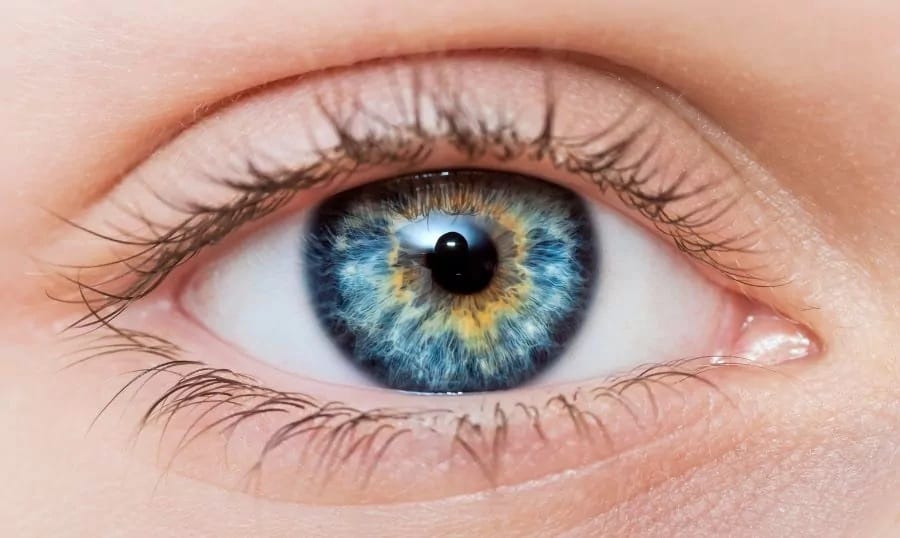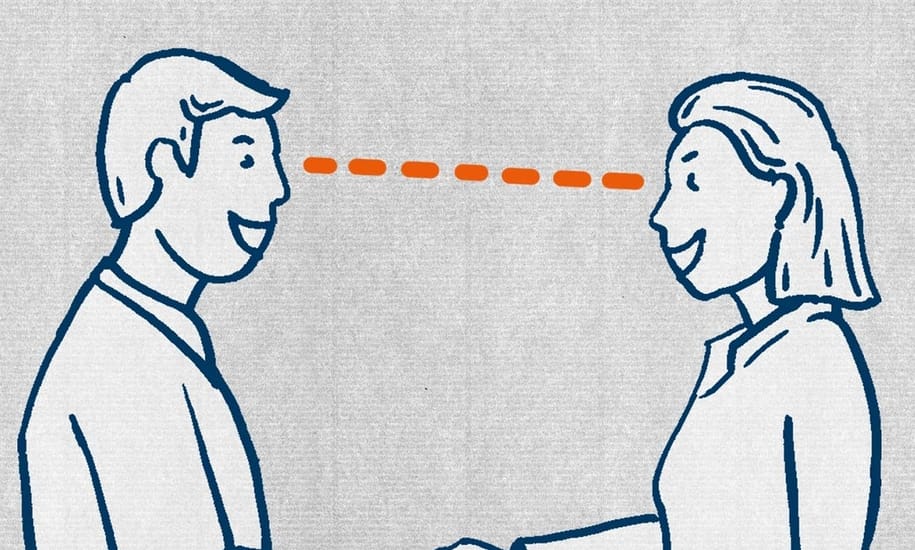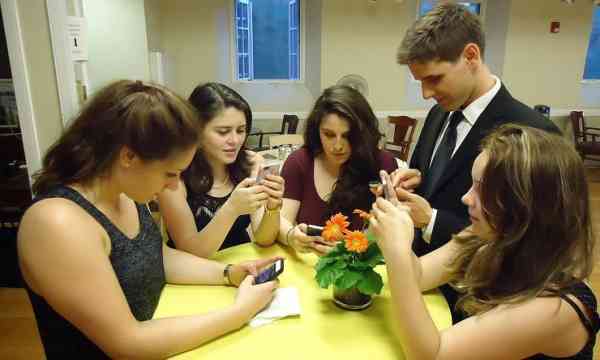- Mind Mastery Minutes
- Posts
- Don't Blink
Don't Blink
Mind Mastery Minutes V1.21

Hello.
I had a thought the other day that I think you’ll find interesting…
1. Eye contact is how we create and maintain connection to other people.
2. We are doing less of it.
I thought it could just be me…
That maybe it’s because I live in London (infamous for it’s unfriendliness).
But it didn’t take me long to find it was a worldwide issue, especially amongst young people:
A US study found that children are getting worse at making eye contact, and 62% of teachers and principals have noticed this decline.

I could be wrong…
But the only explanation I can think of for this is that mobile phones are (at least partly) responsible.
I find this concerning.
I started to think more about what eye contact is, it’s role in our relationships and what it means for the future.
Eye contact is what builds an emotional connection between two persons.
I’d even go as far as to assert that:
The total amount of time you spend making eye contact with someone is directly proportionate to how close you are with that person.
Think about it…
- Your mother 🤰
- Your partner 💑
- Your best friend 👬
The people you are closest to are the people you make the most eye contact with.
Prolonged eye contact releases oxytocin and phenylethylamine, chemicals that are associated with feelings of attraction and bonding.
Eye contact allows us to be attentive, build trust, to speak without speaking, to share a moment, to love.
It brings me pain to think that we will likely continue to do less and less of the thing that brings us all closer together.
Whether we’re scrolling Instagram, replying to a email or listening to music, we’ve got our eyes on our devices and not on each other.
I will reiterate:
1. Eye contact is how we create and maintain connection to other people.
2. We are doing less of it.
Social media removes not only the perceived need for eye contact (phones are more rewarding), but the capability to participate in it altogether (lack of practice).
Nowadays, spending ‘quality time’ with friends or a partner involves avoiding eye contact.
We sit watching sport or a TV program. Go on our phones to fill an ad breaks or when we get bored.
Don’t get me wrong, I’m guilty of this, I like watching sport and TV, but it is somewhat mindless.
A filler or distraction.
We are missing out on so much depth. No depth of conversation, dreams, goals, views on the world, or talking truthfully about how each other are feeling.
These are the experiences that matter.
Not these.

Hopefully this got you thinking.
If you’re interested, below is a journal entry from when I just started writing.
I think it elucidates what I am trying to say here quite well.
For many years, I was heavily addicted to my phone.
But one day, I got lucky.
And my life changed forever.
Back in 2021, my screen time was probably more than 12 hours.
Yep.
If you counted my phone, TV, video games, and laptop, I spent most of my waking hours consuming something—anything.
I wasn’t really living; I was just alive.
I was unlikely to ever stop.
Until I had to.
One day, old reliable died.
You know when you have to angle a charger just right for it to work?
That was my phone.
One day, that angle was gone.
With no money to fix it, I tried not to freak out.
I hadn’t been without a phone for most of my life, so the sudden absence of it felt very foreign.
I felt nervous walking around without it.
Not feeling it against my leg in my pocket.
To begin with, I would pick it up out of habit, only to be greeted with a black screen.
What at first seemed like a bad situation quickly turned into one of the most important things that ever happened to me—and one that I would never forget.
Being without a phone at that time forced me to be present in certain situations.
Walking anywhere, I would have headphones in, music playing.
Not anymore…
Spare minute? Whip out my phone.
Not anymore.
The next day, I had to get a train home.
With no working phone, I thought I’d use this to my advantage and not pay for a ticket.
“Sorry, sir, the ticket is on my phone, but it’s not working.”
A 25-minute walk ahead of me.
I set off.
With nothing to entertain me, I started watching other people go by.
Living in a student area at the time, everyone was young and had similar phone habits to me.
After a few minutes, I saw a real consistency in behavior:
If people were walking alone, without fail, they would either have headphones on, or they would be looking down at their phones as they walked.
We’ve all been there—you pull out your phone to avoid awkward eye contact with a stranger.
Normal, right?
Yes. All too normal. I was struck by it as if I hadn’t noticed it before.
It had always been there; I had just been doing it too, so I hadn’t noticed.
As I walked, I was looking around, listening to my surroundings, taking in things I otherwise wouldn’t have.
It was oddly freeing to walk without a phone.
I started noticing the world around me.
I enjoyed the feeling of the breeze on my skin, the sound of a plane in the sky, and the bustle of conversation from a local coffee shop.
I was actually present on that walk for the first time in years.
I wasn’t hiding in my headphone cocoon.
(You know what I’m talking about—it feels safe in that cocoon, but I assure you, it feels a lot more relaxing to feel connected to the world around you.)
As I made my way closer to my destination, I took my regular route through the park I always walked through.
Although I had walked through it countless times, the park seemed different.
The trees, the grass, the River Taff—it was like I was seeing them all for the first time.
I was in awe of the place, like a toddler taken out into the world for the first time.
As I marveled at the sights and sounds, I thought to myself, “What else have I been missing out on?”
My question was swiftly answered.
As I approached a bridge over the River Taff, I began to hear soft music.
It was friendly but also quite mystical, like something you would hear in a Buddhist temple.
The musician was a man sitting on the bridge, playing a tiny flute.
He was dressed in brightly colored clothes with strange patterns, but it was the sound that grabbed my attention.
As I drew closer, the music became clearer. The peaceful notes instantly brought a smile to my face.
Many people passed me on the bridge, barely noticing the musician.
Each one of them had headphones on and walked past, none the wiser.
I eventually reached the man.
He had a small gray cat that sat contentedly in his lap.
It was so relaxing to be in that moment.
The sound of the water, combined with the music, made a shiver of goosebumps wash over me.
He looked up, stopped playing, and spoke to me with a smile:
“I’ve been here for an hour, and you’re the first person to stop and listen.”
In that moment, I realized that if my phone hadn’t been broken, I would have missed this entire experience.
I would have missed it, just like everyone else.
I wouldn’t even have remembered this walk or ever told this story.
It made me think of all the moments like this I have likely missed in the past.
I thanked the man and headed toward the station.
From that day, I realized how phones can rob us of the beauty of the present moment.
The random eccentricity of existence that shows up when we actually pay attention to it.
Stay in your cocoon and risk never experiencing it.
Cheers for reading!
If like me, you want to spend less time on devices, the links at the bottom of this are extremely useful.
P.S:
My newsletter will be changing (i’m moving platforms). You don’t need to do anything, but it may look a little bit different for the new additions.
All love,
